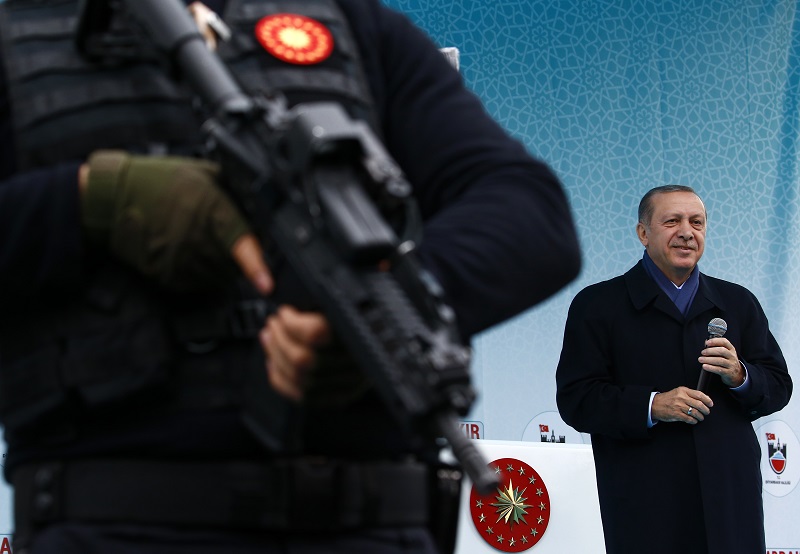Turkish prosecutors today demanded lengthy prison terms for journalists and executives of independent newspaper Cumhuriyet in long-delayed indictment that the International Press Institute (IPI) rejected as “nonsense”.
The indictment, which focuses on former Cumhuriyet Editor-in-Chief Can Dündar, reportedly accuses the journalists and executives of “membership of an armed terrorist organisation” and “helping an armed terrorist organisation while not being a member of it”.
Prosecutors argue that the newspaper, long a bastion of secularism, changed in 2013 when Dündar took the helm. They say he made it “a defender and protector” of outlawed militant Kurdish and leftist groups, and of the religious sect led by U.S.-based cleric and former Justice and Development Party (AKP) ally Fethullah Gülen, who the government blames for the failed July 2016 coup attempt.
The indictment claims Cumhuriyet exceeded the bounds of free expression by “concealing the acts of terrorist organisations” and that its criticism of government policies was part of “an intense perception operation, targeting the government of the Turkish Republic and President Recep Tayyip Erdoğan by using asymmetrical war tactics”.
IPI Director of Advocacy and Communications Steven M. Ellis sharply rejected the allegations.
“This indictment rehashes a number of absurd and already discredited allegations, but those allegations – that Cumhuriyet conspired to help groups it was criticising heavily, groups that were themselves virulently opposed to one another – still don’t make any sense,” he said. “Prosecutors’ efforts to concoct an even-larger conspiracy centred on Dündar now, one that defies logic and common sense, showcase an obvious and desperate bid to silence dissent.”
Ellis noted that the indictment was leaked to pro-government media outlets before it was even given to defence counsel and he criticised the lengthy delay in issuing it.
Ten of the defendants named in the Cumhuriyet case have been held in pre-trial detention in Turkey’s high-security Silivri prison complex for five months; an 11th, investigative journalist Ahmet Şik, has been held since December. Moreover, a chief prosecutor who has been overseeing the case is himself reportedly under investigation for alleged Gülenist connections.
Şik was previously imprisoned for a year starting in February 2011 in the Oda TV case, in which journalists who criticised the Gülen movement, which at that time was close to the AKP party, were accused of supporting coup plotters. Şik was freed in 2012, but that case technically remains open.
In addition to Şik, those held in the Cumhuriyet case include Editor-in-Chief Murat Sabuncu, columnist and IPI Executive Board Member Kadri Gürsel, Cumhuriyet CEO Akın Atalay, board members Önder Çelik and Bülent Utku, cartoonist Musa Kart, Hakan Karasinir, Mustafa Kemal Güngör and Turhan Günay.
Today’s indictment seeks terms of seven-and-a-half to 15 years in prison for Dündar, who in 2016 fled into exile in Germany, as well as Sabuncu and Gürsel for “helping an armed terrorist organization while not being a member.” Co-defendants Aydın Engin, Bülent Yener and Günseli Özaltay face the same charge.
Atalay and Çelik, as well as Mehmet Orhan Erinç, face 11-and-a-half to 43 years in prison on charges of “helping an armed terrorist organization while not being a member” and “abusing trust”. Other defendants in the case face between nine-and-a-half and 29 years in prison.
The journalists in the Cumhuriyet case are among some 150 currently behind bars in Turkey, the world’s leading jailer of journalists. The vast majority of those held were detained as part of a sweeping government crackdown on independent media following the failed July coup attempt.
On Friday, a court ordered 21 journalists from media linked to the Gülen movement freed pending trial, but prosecutors quickly brought other charges and promptly placed them back in detention before they could be released.
The crackdown was part of a larger purge in which hundreds of thousands of people in Turkey have been dismissed from their jobs or detained without due process under wide-ranging powers granted by a state of emergency that Turkey’s government continues to extend.
While media freedom has declined over the last decade in Turkey, the situation has continued to deteriorate ahead of an April 16 referendum on constitutional changes that would vastly expand Erdoğan’s power. Observers have claimed that media outlets under the control of the government or its supporters have suppressed any viewpoints or discussion in opposition to the changes.



